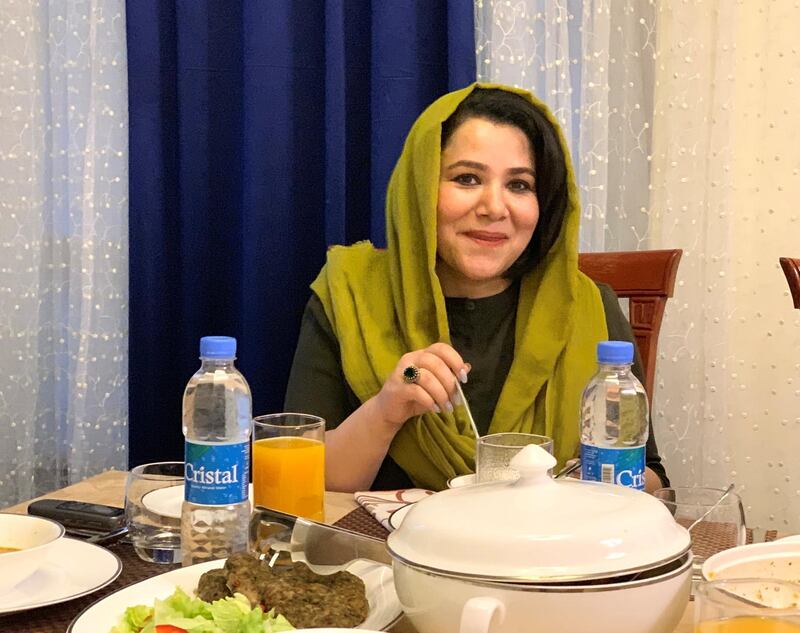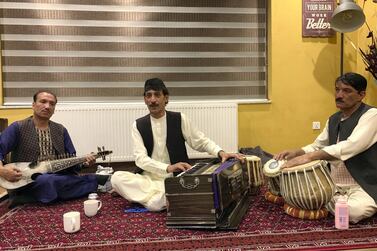After a full day overseeing policy reforms in the mining sector of one the most sensitive and dangerous regions of the world, Nargis Nehan opens her door to friends and relatives for iftar.
As she sets the table, carefully arranging the cutlery and plates of food, Ms Nehan chats with her guests about current affairs and Afghanistan’s performance in the Cricket World Cup. After a short prayer, they break their Ramadan fast with a meal of aush – an Afghan noodle soup, mince kebabs and eggplant.
Even in such a relaxed setting, Ms Nehan’s indomitable personality stands out. As the acting minister for mining and petroleum, her friends around the table occasionally refer to her as “wazir sahib” – “respected minister”. She was given charge of one of the most crucial portfolios in the Afghan cabinet by President Ashraf Ghani in 2017.
It has been a long, difficult journey for Ms Nehan, 37. As a woman with strong ideas and very vocal opinions, she says she has learnt the hard way that there will always be critics of her work. “It’s not just me but all the women in the system who are undervalued for their abilities and contributions,” she says. “I find that men who are very smart, outspoken and opinionated are very appreciated. Those qualities are not seen as an asset in women, but a challenge that intimidates the rest. You have to do a lot of trust-building to change such a situation.”
Afghan society, she says, is still not ready to see an outspoken woman working alongside men as equals.
Ms Nehan's appointment as minister was rejected by parliament, falling six votes short of the 113 required for approval. She believes this was "partly because I am an outspoken reformist woman which shocks them", but also "because of the rampant corruption in the system”.
Several people had urged her to bribe the MPs for their support. “But I told them that their vote is not their personal property that they can barter – it is the confidence of the people. I explained the work I intended to do and if that wasn’t good enough to get their votes, I did not want to indulge in such things."
Despite the lack of parliamentary approval, President Ghani allowed her to run the ministry in an acting capacity.
Ms Nehan, a breast cancer survivor, is made of stern stuff. She does not let critics deter her from her goals for the country and says she lets her work speak for itself. “As a woman I realise I have to work very hard to prove to my colleagues that I know what I am doing and that I can deliver. I think that the kind of reforms I have brought in the system and the ministry have shown my calibre to my critics.”
Her appointment was met with as much enthusiasm as scepticism, thanks to her years of work with international organisations; in the transitional government set up after the 2001 US-led invasion toppled the Taliban; in various ministries; and as head of the Afghan treasury.
In her latest job, she has implemented policies to support mining businesses and encourage investment in a sector that many experts believe could transform Afghanistan away from being an aid-dependent economy to self sufficiency.
Ms Nehan’s humble origins and approachable nature make her a popular and well-liked figure. “I do not come from a political family or a well to do background. I come from a middle class family that had to leave the country during war, struggled as refugees, and worked very hard to get here,” she says.
She spoke of escaping the war as a child and starting a new life as a refugee in Pakistan. When she realised that her family could not afford to pay for her education, she started working with local NGOs for Afghan refugees to put herself and her siblings through school, ultimately earning a master's degree in business administration. She was working for the Norwegian Refugee Council when she got a chance to return to Afghanistan after the fall of the Taliban.
“It was the time when Afghanistan was going through changes and NRC sent me to Kabul to help them set up their office. I met friends and like-minded Afghans who were already working in Afghanistan and making a difference. I decided to stay and work with the new government's Assistance Co-ordination Authority,” she says.
As member of the government and as a woman, Ms Nehan is closely following the ongoing peace talks with Taliban insurgents. She is open to the idea of them joining the political system “if that helps end the war”.
“But it is important they put their guns down and join the system as a political group, the way the mujahideen came,” she said. “If they come as a barbaric group who want to bring down the system, and destroy everything we’ve built, then of course that is a concern, because then the tools that I have for fighting – my words, my voice and my advocacy – are not effective anymore,” she says.
During the talks, the Taliban have offered a softer stance towards women's education and right to work, but many Afghan women find this hard to believe given the group's history of restricting their role in public spaces.
Asked if she was concerned that the Taliban would not approve of her holding a powerful position, she smiles. “It’s OK if they don’t approve of me; I also don’t approve of them. In fact, I reject them.”
The Taliban’s approval is inconsequential, she says. “They are a very small part of the society – we have accepted that, and they also have to recognise and accept our presence. If they don’t, they will be at a loss."






